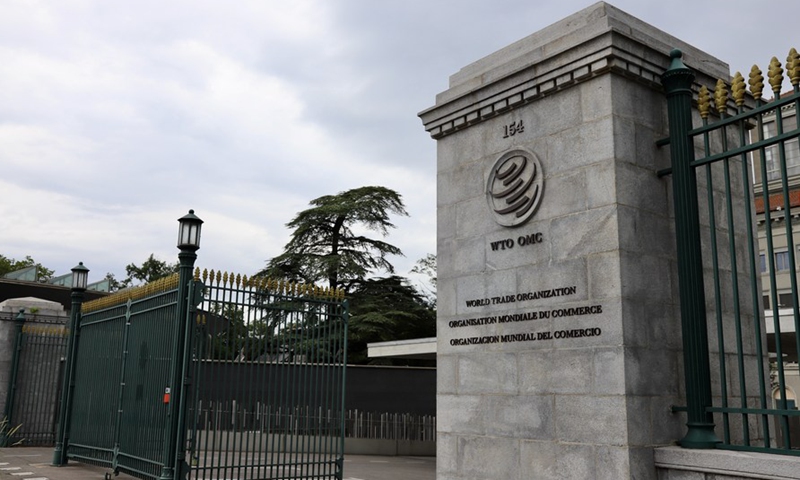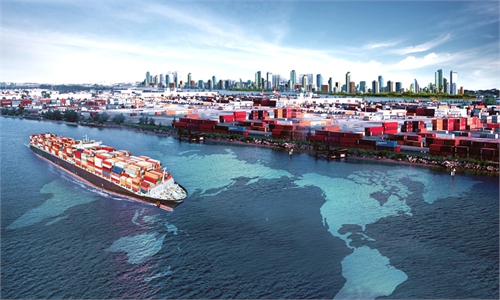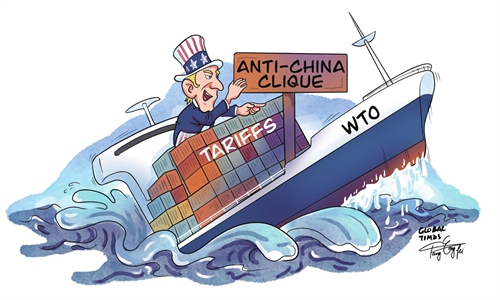China urges US to immediately correct its tariff mistake after WTO ruling
Washington urged to immediately correct tariff mistake after ruling

Photo taken on July 15, 2020 shows an exterior view of the World Trade Organization (WTO) headquarters in Geneva, Switzerland. (Photo by Li Ye/Xinhua)
China's Ministry of Commerce (MOFCOM) on Thursday called on the US to stop looking for excuses and take immediate action to correct its wrong practices against China in trade remedy investigations, saying the US' refusal to carry out WTO rulings hurt the global trade environment, after the WTO delivered another win for China in tariff disputes with the US.The WTO on Wednesday ruled that China can retaliate against $645 million in annual goods trade with the US over Washington's anti-subsidy tariffs on Chinese goods, putting additional pressure on US President Joe Biden, who has so far refused to roll back his predecessor's illegal tariffs on Chinese goods despite dangerous levels of US inflation.
The outcome of this case is of great significance for addressing the US' illegal countervailing practices against China, safeguarding the legitimate trade interests of Chinese enterprises and defending the multilateral trading system, the MOFCOM said in a statement on Thursday.
In 2012, China filed a complaint at the WTO challenging the countervailing duties imposed by the US between 2008 and 2012 on 22 Chinese products, ranging from solar panels to steel wire. The dispute has been under review for nearly a decade.
A WTO arbitrator on Wednesday issued a ruling on China's countervailing measures against the US, holding that China may request authorization from the WTO's Dispute Settlement Body to suspend concessions or other obligations at a level not exceeding $645.121 million per annum against the US.
It is the second time that China has been granted a favorable ruling by the WTO concerning trade retaliation against the US. Previously, China was granted $3.579 billion in annual trade retaliation against the US in a WTO dispute over anti-dumping measures, according to the MOFCOM.
Analysts said that the ruling on Wednesday fully showed that the WTO has recognized the market economy status of China and its state-owned enterprises (SOEs), and it is expected that the success rate of appeals of SOEs in international trade will be significantly improved in the future.
The WTO panel found that the US Department of Commerce acted inconsistently with WTO rules because it determined that certain Chinese SOEs were "public bodies" based solely on the grounds that they were majority owned, or otherwise controlled, by the government of China.
Analysts also said that China's goal is not to raise tariffs but to push the US to lower them, though the US may still refuse to correct its wrong practices as it has done before.
"The US government did not follow the appellate body's ruling to modify or reverse the wrongful practices. In this case, China is authorized by the WTO to retaliate. But I think the US would still refuse to comply," Guan Jian, a partner at Beijing Globe-Law Law Firm, told the Global Times on Thursday.
The WTO ruling on Wednesday also piles up pressure on Biden to remove tariffs on Chinese products imposed by his predecessor Donald Trump, which have already been determined illegal by the WTO and are causing headache for the US economy.
A WTO appellate body judge ruled in October 2020 that additional tariffs imposed by Trump on $200 billion worth of Chinese products violated international rules. Biden has not removed the tariffs.
"Wednesday's ruling was different from the additional tariffs imposed on $200 billion worth of Chinese products in the Trump era," Hu Qimu, chief research fellow at the Sinosteel Economic Research Institute, told the Global Times on Thursday, noting that the Trump-era tariffs are mixed with political factors.
Analysts said that the White House is now facing a dilemma, as additional tariffs by both sides will continue to weigh on the US economy, particularly its sky-high inflation.
"China's manufacturing industry is not afraid of US tariffs, because US consumers paid and will pay for the tariffs imposed on Chinese goods, contributing to today's inflation in the US and even affecting current US monetary policy," Hu said.
The annual inflation rate in the US accelerated to 7 percent in December 2021, a fresh high since June of 1982, according to the US Bureau of Labor Statistics.
As a major world consumer market, the US imports a large number of industrial and consumer goods from China, and there are no alternatives, especially amid the COVID-19 pandemic, Hu noted.
He said that the US wanted to build manufacturing bases in North America, Mexico and Southeast Asia. However, manufacturing in these places has also been disrupted by the outbreak of COVID-19, and only China's manufacturing sector is functioning smoothly and providing goods and services to the world.



